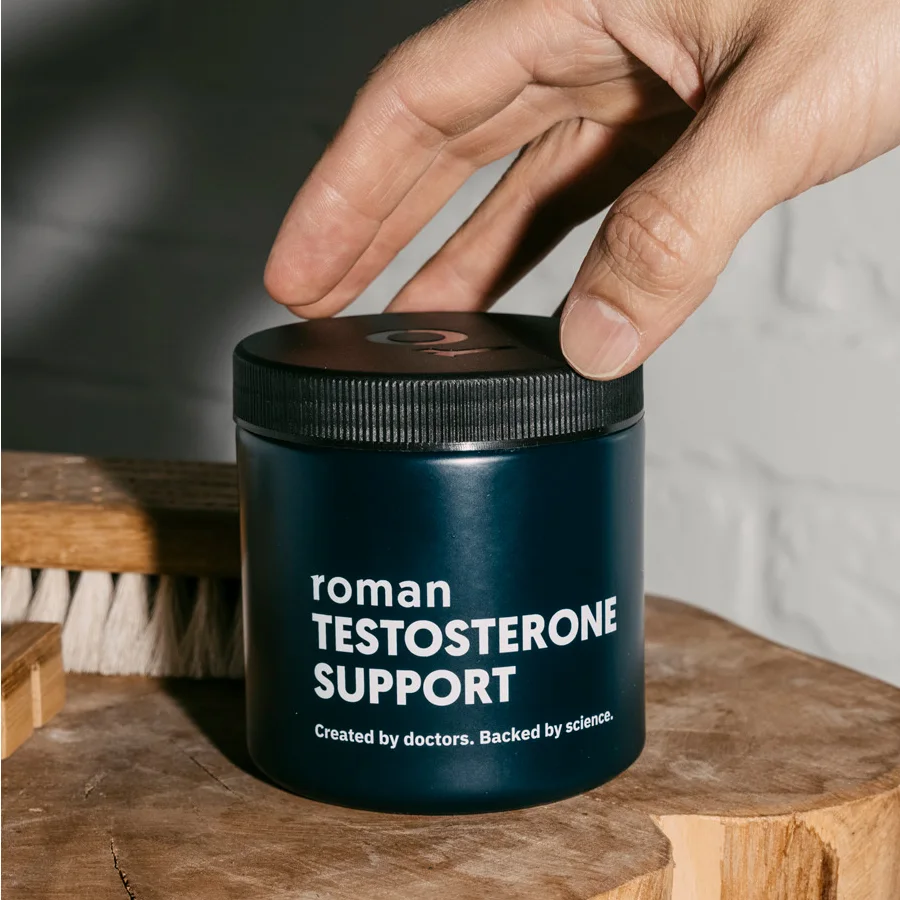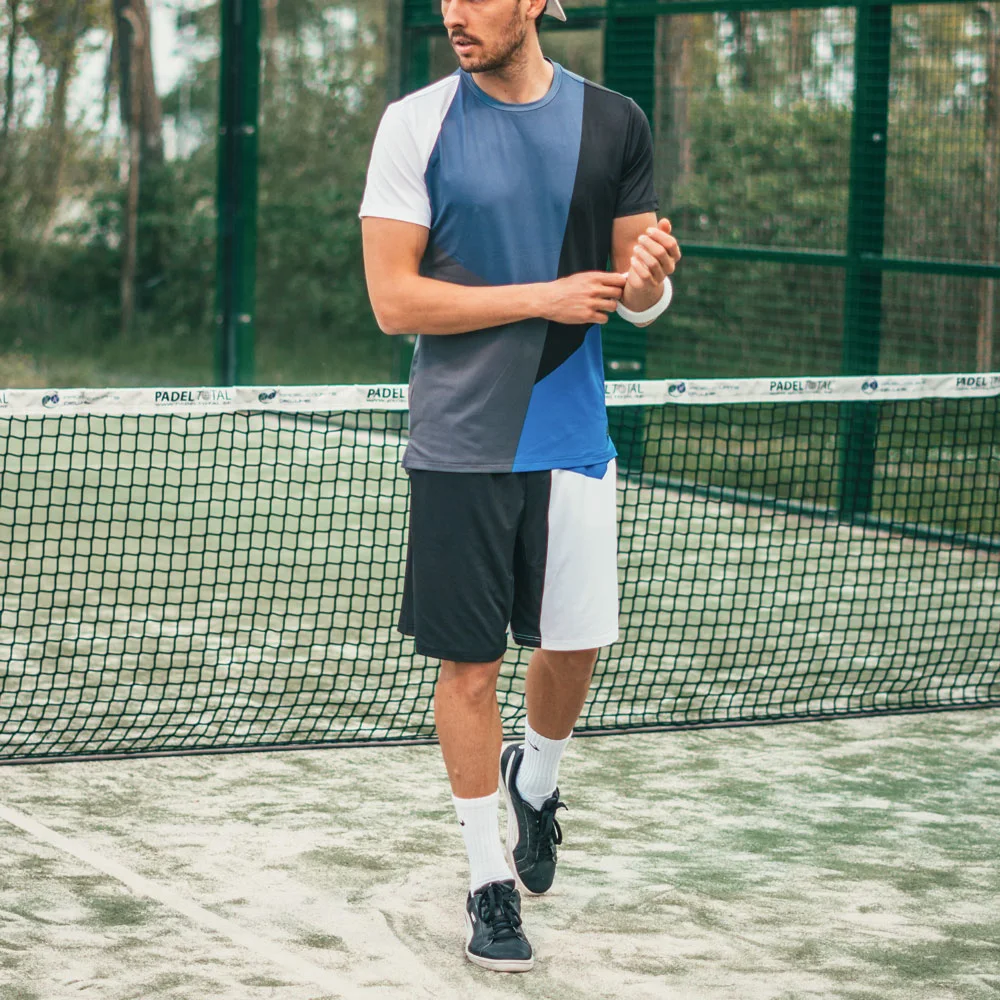Here's what we'll cover
Here's what we'll cover
You've probably seen ads warning against low testosterone or noticed brightly colored bottles stacked in health food stores with names containing words like Power, Andro, Monster, and Stack.
These products claim to naturally increase testosterone levels, but do testosterone boosters work?
What is testosterone?
Testosterone is an androgen (male sex hormone) produced by the testicles and adrenal glands. This hormone is present from birth and is what makes a fetus biologically male.
During puberty, surging testosterone levels produce secondary sexual characteristics like muscle growth, body hair, and sperm production. Testosterone plays an important role in men’s health throughout life, regulating key functions like libido (sex drive), erectile function, bone density, and mood.
Low testosterone, also known as low T, hypogonadism, or testosterone deficiency, tends to become an issue as men get older. Testosterone levels drop naturally with age, beginning in your 30s and 40s. Approximately 40% of men over age 45 have low testosterone (Sizar, 2021).
You can check your testosterone levels with a blood test or saliva sample. Normal blood testosterone levels in men range from 270–1,070 ng/dL. A value below 300 ng/dL qualifies as low testosterone (Mulhall, 2018). These exact values may vary depending on the lab or resource you use.
Symptoms of low T include erectile dysfunction (ED), decreased libido, lower muscle mass, hair loss, and reduced sperm count (Sizar, 2021).
What are testosterone boosters?
If you have a true testosterone deficiency, talk to your healthcare provider about the best course of action. This may include treatments like testosterone replacement therapy (TRT) (more on that below).
If you want to support the testosterone levels you have, several supplements or "testosterone boosters" show promise. When shopping for testosterone supplements, keep in mind that there is limited clinical research on these compounds.
Benefits of testosterone boosters
Here are some herbal and natural supplements purported to boost testosterone:
DHEA: Dehydroepiandrosterone (DHEA) is a hormone produced in the adrenal glands. Some studies suggest that coupling exercise with a DHEA supplement supports free testosterone levels. However, other trials found no difference (Liu, 2013).
Fenugreek: A few small studies suggest that taking fenugreek positively affects testosterone, while others show no effect (Balasubramanian, 2019).
D-aspartic acid: This is an amino acid naturally found in the body’s endocrine system. Aspartic acid has been found to support testosterone levels in animal studies, though data in humans is limited and inconsistent (Roshanzamir, 2017).
Tribulus terrestrisThis Ayurvedic herb is a popular workout supplement said to elevate low T levels. So far, there’s limited scientific evidence to suggest this herb affects hormone levels (Pokrywka, 2014).
Ashwagandha: This medicinal herb is called an adaptogen, a natural agent that helps the body manage stress. We all know stress affects the body, and it may also play a role in testosterone production. Studies suggest that ashwagandha supplements support testosterone, though more research is needed (Lopresti, 2019).
As we mentioned earlier, there’s another class of testosterone boosters you can’t miss if you’ve been inside a health foods store. Many of these products promise muscle growth, increased testosterone, and offer “anabolic” and “prohormone” effects. They may also claim to contain some of the natural or herbal ingredients above.
There is little to no evidence that these products do what they claim, and taking them can be dangerous, resulting in liver or kidney injury (Almaimian, 2018).
Risks and side effects of testosterone boosters
As with lots of supplements, testosterone boosters have risks that may outweigh potential benefits. Unlike prescription drugs, many supplements aren’t regulated by the U.S. Food and Drug Administration (FDA).
Because testosterone boosters aren't regulated, they could contain dangerous or unreported ingredients. In addition, experimenting with anabolic boosters or TRT without a prescription could actually lower natural amounts of testosterone your body makes—the opposite of what was intended.
Testosterone boosters most likely to have this effect are ones with “prohormones” that mimic testosterone. Why does this happen? By taking certain testosterone boosters, your body thinks it doesn’t need to produce the hormone on its own anymore. Natural supplements like vitamin D and zinc don’t have this effect because they support natural testosterone production.
Testosterone boosters are not recommended for everyone. There’s also scant evidence they work. Substances like prohormones can side effects like acne, mood problems, gynecomastia, and liver or kidney damage (Rahnema, 2015).
Other ways to boost testosterone
It may be possible to increase testosterone levels by making lifestyle changes. These include:
Improving your diet
Getting more exercise, including weight lifting and high-intensity interval training (HIIT)
Cutting back on alcohol
Getting quality sleep
TRT is also an option for some men and is available in several forms:
Topical gels (brand names AndroGel, Testim, and Fortesta)
Transdermal patches (brand name AndroDerm)
Testosterone solutions (brand name Axiron)
Testosterone injections
Cheek patches or buccal testosterone systems (brand name Striant)
Implanted testosterone pellets (brand name Testopel)
Oral testosterone tablets (brand name Andriol, Restandol)
It’s important to note: people who don’t have low T don’t need testosterone boosters. If you have low testosterone, it’s better to address it with lifestyle modifications and work with a healthcare provider to develop the best treatment plan for you.
DISCLAIMER
If you have any medical questions or concerns, please talk to your healthcare provider. The articles on Health Guide are underpinned by peer-reviewed research and information drawn from medical societies and governmental agencies. However, they are not a substitute for professional medical advice, diagnosis, or treatment.
Almaiman, A. A. (2018). Effect of testosterone boosters on body functions: Case report. International Journal of Health Sciences, 12 (2), 86–90. Retrieved from https://www.ncbi.nlm.nih.gov/pmc/articles/PMC5870326/
Balasubramanian, A., Thirumavalavan, N., Srivatsav, A., et al. (2019). Testosterone imposters: an analysis of popular online testosterone boosting supplements. The Journal of Sexual Medicine , 16 (2), 203–212. doi:10.1016/j.jsxm.2018.12.008. Retrieved from https://www.ncbi.nlm.nih.gov/pmc/articles/PMC6407704
Liu, T. C., Lin, C. H., Huang, C. Y., et al. (2013). Effect of acute DHEA administration on free testosterone in middle-aged and young men following high-intensity interval training. European Journal of Applied Physiology , 113 (7), 1783–1792. doi:10.1007/s00421-013-2607-x. Retrieved from https://www.ncbi.nlm.nih.gov/pubmed/23417481
Lopresti, A. L., Drummond, P. D., & Smith, S. J. (2019). A randomized, double-blind, placebo-controlled, crossover study examining the hormonal and vitality effects of ashwagandha ( Withania somnifera ) in aging, overweight males. American Journal of Men's Health , 13 (2), 1557988319835985. doi:10.1177/1557988319835985. Retrieved from https://www.ncbi.nlm.nih.gov/pubmed/30854916
Mulhall, J. P., Trost, L. W., Brannigan, R. E., et al. (2018) Evaluation and management of testosterone deficiency: AUA guideline. Journal of Urology, 200,
Pokrywka, A., Obmiński, Z., Malczewska-Lenczowska, J., et al. (2014). Insights into Supplements with Tribulus Terrestris used by Athletes. The Journal of Human Kinetics, 41: 99-105. doi: 10.2478/hukin-2014-0037. Retrieved from https://pubmed.ncbi.nlm.nih.gov/25114736/
Grucza, R. (2014). Insights into Supplements with Tribulus Terrestris used by Athletes. Journal of Human Kinetics , 41, 99–105. doi:10.2478/hukin-2014-0037. Retrieved from https://pubmed.ncbi.nlm.nih.gov/25114736/
Rahnema, C. D., Crosnoe, L. E., & Kim, E. D. (2015). Designer steroids - over-the-counter supplements and their androgenic component: review of an increasing problem. Andrology , 3 (2), 150–155. Retrieved from https://pubmed.ncbi.nlm.nih.gov/25684733/
Rao, A., Steels, E., Inder, W. J., et al. (2016). Testofen, a specialised Trigonella foenum-graecum seed extract reduces age-related symptoms of androgen decrease, increases testosterone levels and improves sexual function in healthy aging males in a double-blind randomised clinical study. The Aging Male , 19 (2), 134–142. doi:10.3109/13685538.2015.1135323. Retrieved from https://www.ncbi.nlm.nih.gov/pubmed/26791805
Roshanzamir, F. & Safavi, S. M. (2017). The putative effects of D-Aspartic acid on blood testosterone levels: A systematic review. International Journal of Reproductive Biomedicine (Yazd, Iran) , 15 (1), 1–10. Retrieved from https://pubmed.ncbi.nlm.nih.gov/28280794/
Sizar, O. & Schwartz, J. (2021). Hypogonadism. StatPearls . Retrieved from https://www.ncbi.nlm.nih.gov/books/NBK532933/










